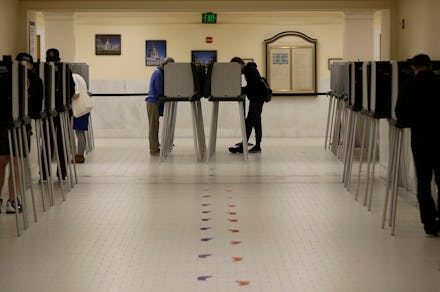These are the key issues to look out for this 2016 election season

While the nation chooses a new president on Nov. 8, voters in many states will decide some key ballot measures on marijuana, gun control and the minimum wage.
Here's a guide to some of the top issues on many ballots in states across the country this year:
Minimum wage
There are four states voting to increase the minimum wage — and one state will vote to decrease it.
The federal minimum wage is $7.25 an hour. But several states have raised that figure, to as much as $10 an hour in California and Massachusetts.
This year, Maine, Colorado, Arizona and Washington state all have measures on the ballot this year asking voters to increase the minimum wage.
Maine currently has a minimum wage of $7.50 an hour. Question 4 on the ballot asks voters to raise that amount to $9 an hour in 2017, and then to $12 an hour by 2020, according to Ballotpedia.
Colorado's Amendment 70 would raise the state's $8.31 an hour minimum wage in increments until it reaches $12 by 2020.
In Arizona, Proposition 206, also known as the Minimum Wage and Paid Time Off initiative, asks voters to raise the state's minimum wage from $8.05 an hour to $10 next year and then $12 by 2020. After that, the minimum wage would be raised to keep pace with the cost of living. It would also require large business to give employees 40 hours of sick time a year, and small businesses to give 24 hours of sick time a year.
In Washington state, voters will vote on Initiative 1433, which would create the highest minimum wage in any state in the country, from $9.47 an hour to $13.50 an hour by the year 2020. The measure also mandates paid sick leave.
And in South Dakota, Referred Law 20 asks voters to lower the state's minimum wage from $8.55 an hour to $7.50 an hour for workers under the age of 18, according to Ballotpedia.
Gun control
Despite several recent high-profile deadly mass shootings, like the San Bernardino and Orlando attacks, there are only four states voting on gun control measures this year.
California, Maine, Nevada and Washington all have measures on the ballot to tighten restrictions on guns in some way.
In California, Proposition 63 would ban possession of large-capacity ammunition magazines and require sales of ammo to be made through a licensed vendor. The measure also requires a background check to buy ammunition.
Maine does not currently have its own law regarding background checks for gun purchasers, so it follows federal regulations for all gun sales. Question 3 on the ballot would "require that in cases when neither party is licensed, they must meet at a licensed dealer, who would then complete a background check on the transferee."
In Nevada, Question 1 asks voters to decide whether to require a third party licensed dealer for gun sales. And Washington's Initiative 1491 would allow a court to issue an "extreme risk" protection order to remove a person from access to firearms.
Marijuana
Alaska, Colorado, Oregon, Washington have all legalized marijuana. Even the nation's capital, Washington, D.C., has decriminalized the drug. Now five more states will decide whether to join them.
Arizona, California, Maine, Massachusetts and Nevada will vote this year on whether to legalize recreational marijuana use for adults. All five states already allow the use of medical marijuana.
Four other states have marijuana-related measures on the ballot, according to Ballotpedia.
In 2004, voters in Montana approved the use of medical marijuana. But the law limited medical providers from treating more than three patients at once. This year, the Medical Marijuana Initiative, or Initiative 182, would lift that restriction, include post-traumatic stress disorder as a qualifying condition and set fees to help pay for regulation and oversight.
Voters in North Dakota will decide on legalizing marijuana for medical use. Initiated Statutory Measure 5 would limit prescriptions to three ounces every two weeks and create non-profit "compassion centers" to grow and sell marijuana.
Arkansas is also voting to legalize medical marijuana. There are two measures on the ballot. Issue 6 would legalize the use of medical marijuana. And Issue 7 would give the state regulatory control. Users would be required to get a prescription from their doctor and only certain medical conditions would qualify for medical marijuana use. The measure would allow patients who live more than 20 miles from a dispensary to grow their own plants and would provide financial help for low-income patients.
And while Florida voters passed the Compassionate Medical Cannabis Act in 2014, allowing patients to use non-smoked low THC marijuana, this year voters will decide on Amendment 2, a broader medical marijuana bill that lifts many of those restrictions.